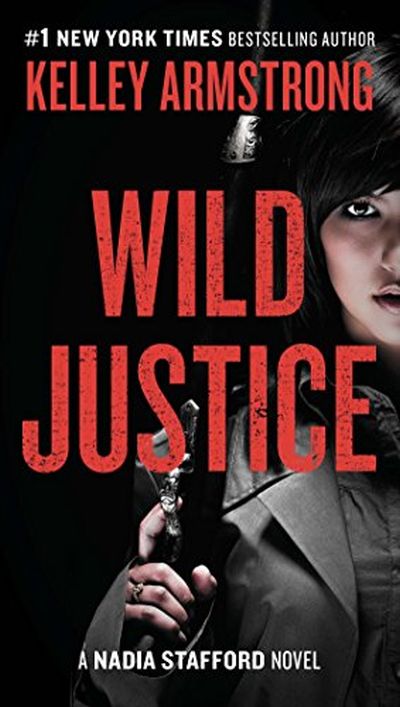Literary rating: ★★★★★
Kick-butt quotient: ☆☆
With this 2013 novel, Armstrong brings her original Nadia Stafford trilogy to a satisfying conclusion (although the two later novellas carry on the story in a rewarding way). Again, six months have passed since the previous installment, so our chronological setting is the latter part of October, 2007.
By the end of the second novel, Nadia had recognized that her true romantic feelings are for Jack. But she also concluded that her taciturn and seemingly unemotional mentor didn’t return them (although readers might be less sure of that). So in the intervening months since, she and Quinn have added a sexual component to their long-distance relationship (they get together about once a month). For readers who view sex as expressive body language for a total self-giving in life-long love and fidelity, it’s not hard to predict that introducing it into a situation where both parties profess no hurry to be committed (and one is in love with someone else) is likely to end in emotional disaster.
 That’s what happened here, about a month ago,with Quinn wanting to move in the direction of engagement and marriage and Nadia not willing to, leading to a messy breakup that left him very hurt and her “feeling like [vulgarism deleted].” :-( On top of that stress, when this book opens, she’s in rural Michigan on a job (of the kind that she doesn’t advertise). That quickly results, though through no fault of her own, in a traumatic event which has her on the point of meltdown. But before long, she’s in for a moral and emotional ordeal which will make her present distresses look relatively mild.
That’s what happened here, about a month ago,with Quinn wanting to move in the direction of engagement and marriage and Nadia not willing to, leading to a messy breakup that left him very hurt and her “feeling like [vulgarism deleted].” :-( On top of that stress, when this book opens, she’s in rural Michigan on a job (of the kind that she doesn’t advertise). That quickly results, though through no fault of her own, in a traumatic event which has her on the point of meltdown. But before long, she’s in for a moral and emotional ordeal which will make her present distresses look relatively mild.
Both previous novels have made us aware of the formative event of Nadia’s life, which happened when she was only 13. That was the night she and her beloved 14-year-old cousin Amy (with Nadia along because, as usual, she was trying to keep the headstrong older girl out of trouble) got taken to a lonely woodland cabin by a budding psychopath in his early 20s named Drew Aldritch. Nadia was able to escape and run for help, but Amy still ended up raped and killed. At the trial, Nadia wasn’t called to testify; and it didn’t help that Amy was a bit of a “wild child” with a reputation as a flirt.
The defense exploited that to claim that the sex was “consensual,” and that Aldritch strangled his victim to death “accidentally.” So the jury acquitted him. (Yes, this is fiction; but sadly, even in real life, there are jurors who would actually be that idiotic.) He left town immediately; and Nadia hasn’t seen him since. But the horror of the tragedy, and the survivor’s guilt, has stayed with her for 20 years, shaping her into the adult woman she became, and leaving her with intermittent nightmares from which she still wakes up screaming.
Jack knows something about the baleful influence of teenage trauma (and we’ll learn something, in the course of this book, about his past and how it shaped him –our leading lady here isn’t the only character with painful baggage). Early on, Jack discloses that, on his own initiative, he’s tracked Aldritch down to where he’s now living in Ohio under his latest alias, and working, of all things, as a small-town cop –and there’s good reason to believe that his behavior and proclivities haven’t changed for the better in the ensuing decades. So Nadia now has to decide what to do with this knowledge. Whatever happens, this trip down Memory Lane is not going to be a pleasant stroll; and it will prove to be a dark, harrowing, twisty and dangerous one, with more than one major surprise.
As usual, there’s a genuine mystery (actually, more than one) at the heart of this tale; and solving it, and surviving to the point of solving it, will be a challenge. (Luckily, Nadia’s tough and resourceful.) In terms of style, this book is much of a piece with the preceding ones in most respects, including the language issues. Again, there’s no explicit sex, but there is some unmarried sex that takes place, and some scenes are steamier than some readers might want. Romance, and related angst, doesn’t take over the plot, but it plays a more important role than it has up to now, and there will be a significant development in that area. (The books definitely are best read in order.) At one point, a character imparts a crucial piece of information that later developments show that he wouldn’t have known, but that’s the only logical slip; in the main, the plotting is impeccable. For any readers who liked the first two books, this one has to rank as a must-read; and I don’t believe any of them will be disappointed with it!
Author: Kelley Armstrong
Publisher: Penguin Group; available through Amazon, both for Kindle and as a printed book.
A version of this review previously appeared on Goodreads.




